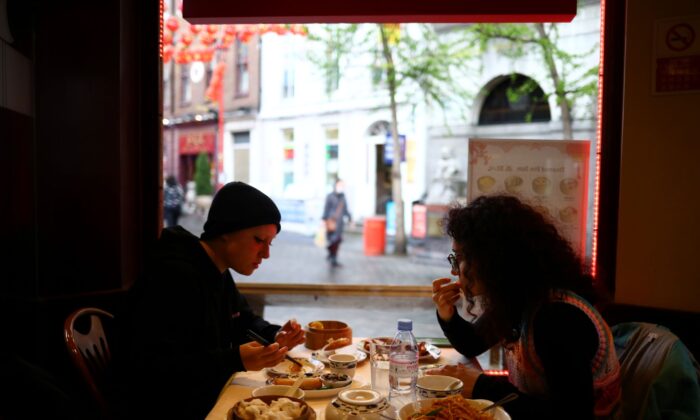Commentary
It is widely acknowledged that “political fear” arises from a totalitarian system that suppresses freedom of speech. Yet, the Chinese community in the UK continues to grapple with the absence of “freedom from fear” despite the UK’s strong human rights record.
Will Chinese voters in the UK be able to cast unbiased ballots in a democratic system?
The reality is that true freedom of choice cannot exist without individual freedom.
While various fears are inherent to human society, political fear is a product of man-made political systems. In a democratic society, people can strive for “freedom from fear” through electoral and political reforms. However, in a totalitarian regime, political fear is a tool of control that cannot be altered.
The Chinese diaspora in the UK finds themselves caught between these two systems. Despite living in a democratic nation, they are still influenced by China’s authoritarian rule, where freedom of expression is suppressed. This migrant community, with a population exceeding 500,000 in the UK alone, faces a unique struggle.
Generations of Chinese people have been shaped by imperial and authoritarian rule, instilling deep-seated political fear that persists across generations. Even as they reside in the UK, they remain mentally bound by China’s political system, continuing to adhere to the values instilled by Mao Zedong’s regime.
Forming hometown associations and expressing a desire to “Sinicize” the UK, Chinese individuals in the UK aim to maintain ties with China and uphold their cultural identity. However, the blurred lines between traditional Chinese culture and communist ideology often lead to misunderstandings.
Despite living in a democratic society, Chinese individuals in the UK are cautious about openly discussing politically sensitive topics or engaging in activities that may be perceived as critical of the Chinese government. The fear of repercussions from Beijing underscores their continued allegiance to China’s political culture.
The collective self-deception within the Chinese community is bolstered by both British and Chinese authorities, contributing to the erosion of democratic freedoms in the UK. Economic interests often take precedence over human rights concerns, leading to a shift in power dynamics.
As China’s influence grows globally, the CCP’s control over overseas Chinese communities becomes more pronounced, impacting political landscapes in democratic nations. The Belt and Road Initiative serves as a conduit for Chinese influence, reshaping political narratives and alliances.
The infiltration of democratic systems by authoritarian regimes poses a significant threat to global democracy. The Chinese diaspora, rooted in Chinatowns across democratic nations, grapples with conflicting loyalties and political ideologies, shaping their interactions with their host countries.
The world faces complex challenges, and the Chinese diaspora’s intricate relationship with China underscores the need for a nuanced understanding of cultural and political dynamics within migrant communities.
Many individuals who speak Chinese live in constant fear. The fear is so pervasive that even expressing a desire for “freedom from fear,” a fundamental human right, is risky. Chinese immigrants often rely on the system to navigate political fears, joining associations to showcase their contributions to China from the UK, ensuring their safety and financial stability.
The political censorship imposed by the CCP does not align with the freedoms of British society. This survival strategy of the Chinese in democratic countries may lead to heightened political tensions. The Chinese government is likely to increase its influence in British governmental and social circles, inundating Chinese communities with state-sponsored propaganda.
Confucius Institutes and universities could potentially become hubs for restricting free speech. China’s ambassador recently visited Cambridge University to encourage students to prioritize loyalty to China, instilling fear in those who value freedom. Individuals who support British democracy may face backlash, risking the closure of their family businesses. The fear of repercussions, as seen in the case of billionaire Jack Ma, stifles dissent among small business owners.
The fear instilled by China’s authoritarian regime inhibits independent thinking among young Chinese individuals. State media propaganda in the UK further suppresses students’ inclination towards free expression. Professors teaching at Chinese universities fear reprisals if they promote democratic ideals. China’s elaborate internet censorship system ensures that any dissenting voices are swiftly silenced.
The fear perpetuated by the CCP lingers even after Chinese individuals move to democratic societies. This invisible fear becomes ingrained, stifling any aspirations for freedom. Chinese immigrants, holding British passports, find themselves caught between two worlds – beneficiaries of the British system yet hostages to authoritarian rule. This political fear seeps into Chinese micro-communities, impacting British society as a whole.
Democratic nations like the UK face a growing influence from pro-Xi Jinping factions within the overseas Chinese community. More individuals are being swayed by Xi’s vision of a new world order, potentially shaping policies across various sectors.
To safeguard British democratic values, it is crucial to combat CCP propaganda and call for an end to internet surveillance and censorship targeting the Chinese community in the UK. Economic gains from China come at a political price, and the authoritarian regime will not hesitate to leverage economic power for political gain.
Political fear looms over the Chinese population in the UK, and it is imperative for the British government to address this issue. By empowering British passport holders of Chinese descent, the government can uphold democratic principles and resist authoritarian influences.
Views expressed in this article are opinions of the author and do not necessarily reflect the views of The Epoch Times.





